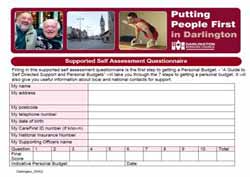Assessment and Eligibility
Asking for help from Adult Social Care
You can contact Darlington Learning Disability Service yourself or ask someone to make contact for you if you feel you need information, advice or support in your life or for a person you care for.
The Council has to offer an assessment of need to people who are disabled, people with a learning disability, people who misuse drugs or alcohol and people who are carers.

What is an assessment?
An assessment is where you tell Adult Social Care what you feel you need to live as independently as possible. To help work out if you can get support you will need to tell us:
- What you think your needs are
- How you think your needs can be met
- What you want to be able to do

You can tell the Council what your needs are by filling in a form called a "Self Assessment Questionnaire". You can have support to fill this in from your care manager or someone else if you wish.

Following your assessment, your care manager will tell you about the support you are able to receive.
You may have different levels of need for different areas of your life. This means that you may have some needs that Adult Social Care will support and other needs which Social Care are not able to support.
For those needs social care cannot help you with you will be provided with information and advice on where you can get support.

How is it decided who gets support from Adult Social Care?
The "Eligibility Criteria Policy" is used to decide who is able to get support and the level of support that is needed.
When Adult Social Care carry out an assessment for someone, a number of areas of that person’s life are looked at including:
- the risk of losing their independence,
- their health
- how they manage their daily lives
- involvement in family and community life
By looking at these areas, a decision can be made about what level of risk there is for that person and whether they can have support from Adult Social Care. Some support the Council provide such as Reablement is not affected by eligibility criteria.

People’s level of risk will be one of the following:
- Critical - the person is at risk of serious harm and their life is, or will be, threatened if they do not have support.
- Substantial - the person needs a lot of support but can manage a few things for themselves.
- Moderate - the person can manage more things for themselves but would benefit from support with several parts of their life.
- Low - the person would benefit from support with one or two things in their life.
It is up to each council to decide which of the four levels of need that they are able to meet.

What does the Council support at the moment?
Currently Darlington Council meets needs in only critical and substantial levels. Those with moderate and low level needs will receive advice and information about where they can go to buy support themselves.

What if your needs change?
Everyone who receives support following an assessment will have their needs looked at again:
- to look at whether your needs have changed
- to make sure the support you receive is working
- to see whether you would benefit from more or less support
If your needs change you should contact Adult Social Care and ask for another assessment.

If you are entitled to support, what types of support are available?
- Direct payments – a cash payment so you can arrange your own support
- Equipment and adaptations – to aid independence
- Day opportunities
- Short breaks for carers
- Home care
- Residential care – for when it is no longer safe for you to live at home
- Information and advice – on other support available to meet your needs
- Reablement – Short term support for you after illness a stay in hospital or to prevent you going into hospital.

